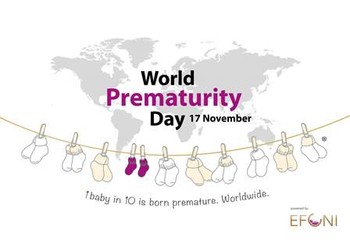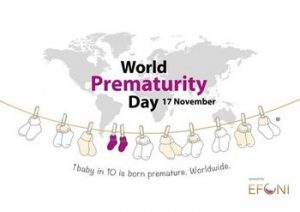

World Prematurity Day on 17 November is one of the most important days in the year to raise awareness of the challenges and burden of preterm birth globally. World Prematurity Day calls attention to the special issues facing infants born prematurely, celebrates the development and growth of older babies and children who were born prematurely, and is a great day to support members of your community who work with newborns or premature infants, or are parents adjusting with a prematurely born infant.
The day was initiated by EFCNI and partnering European parent organisations in 2008. The international co-founders LittleBigSouls (Africa), March of Dimes (USA) and National Premmie Foundation (Australia) joined the celebrations and made World Prematurity Day an intercontinental movement. Meanwhile, countless individuals and organisations from more than 100 countries join forces with activities, special events and commit to action to help address preterm birth and improve the situation of preterm babies and their families.
What is Prematurity?
A full-term pregnancy lasts between 37 and 42 weeks, and “prematurity” describes when a baby is born earlier than 37 weeks (gestational time). Prematurely born infants face many special issues, which can include breathing difficulties, feeding difficulties, and low birth weight. Prematurely born babies generally have a longer hospital stay than babies born full-term, and many end up spending time in NICU units (neonatal intensive care) or special care nurseries until it can be established that they are stable and healthy enough to be brought home. This can be a very difficult time for many families.
There are some risk factors for having a premature birth, such as the mother’s general health and lifestyle choices, and carrying multiple babies (twins or triplets), but for many mothers who deliver a premature baby, it is unexpected, with no discernible cause or identifiable risk factors- mothers under excellent prenatal care, who do everything “right” can still end up delivering their baby prematurely. If you are pregnant, it is a good idea to learn the warning signs of pre-term labor, which include cramping, regularly times contractions, and backache, and discuss pre-term labor risks and planning with your care provider. If you do believe you are experiencing pre-term labor signs, it is critical to seek medical attention right away, because there are steps that can be taken to manage, delay, or prevent a baby from being born prematurely.
Thanks to advances in modern healthcare, the prognosis for most babies born prematurely has improved dramatically. Statistically, the earlier a baby is born, the more serious his or her health problems are likely to be.
A day like this is a great reminder of how grateful I am to live now with the medical advancements of the last century. Our boys arrived very early and had to stay in the hospital for a month. It was a difficult time, but the hospital staff was so supportive. I don’t even want to think about what could have happened, had we lived in different times.
